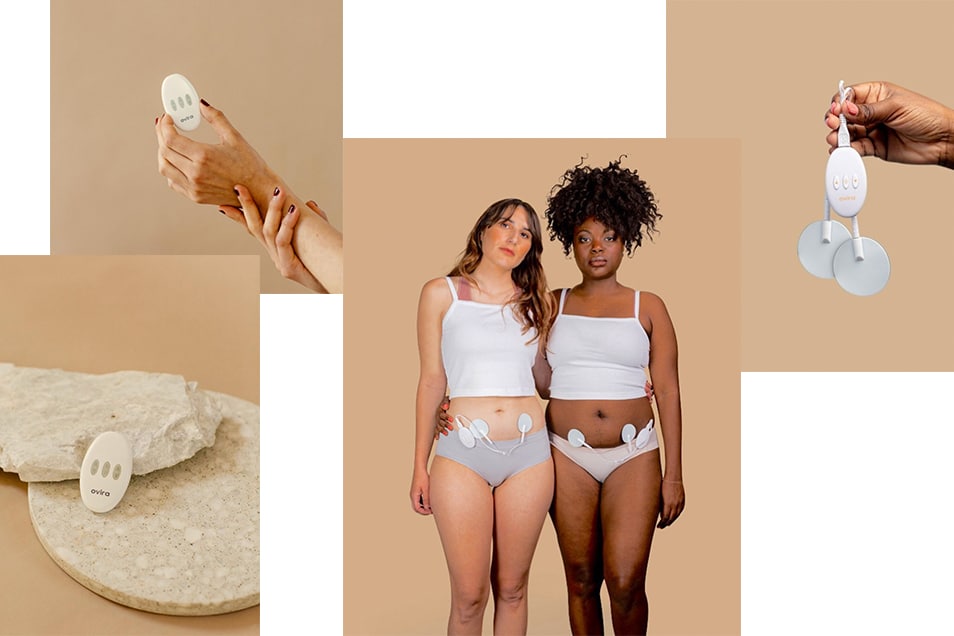
When I first heard about Ovira, a period pain-blocking device developed by 27-year old Alice Williams, I couldn't really wrap my head around it. My period pains have grown with me. Now in my twenties, I'm surprised on the months it comes and I don't have to take codeine to get through the pain without being sick. With no real solutions and no real discussions around period pain, it's always been a part of life that I've come to accept. Women's pain has always been ignored or minimised, there is no argument here. This couldn't be clearer when met with the facts that endometriosis affects one in ten Australian women, and that the average woman with endometriosis can take up to 10 years to be properly diagnosed. Williams is one of these women, living with endometriosis and having had no real solutions provided to her, she decided that heavy painkillers, the pill or surgery weren't a future she was interested in living through, which lead to the birth of Ovira.
We got in touch with her to find our more about Ovira and why we need a bigger conversation about period pain and endometriosis.
What is Ovira?
Ovira is a small, wearable device designed to instantly stop period pain. As a brand, Ovira is a much-needed community for women to share their stories and ultimately, have their pain validated.
How does it work?
Ovira uses low-level pulses of electric vibrations, which can block pain signals from entering the brain. It’s a method of transcutaneous electrical nerve therapy (TENS)—which works by stimulating the nerves at point of contact, that overload the brain’s pain receptors almost instantly to provide pain relief. It’s a therapy most commonly used to alleviate pain for women in labour, cancer patients and by physiotherapists to aid in muscle recovery. The device is worn under clothing on the lower back or abdomen. It’s discreet; two small soft patches called ‘Love Handles’ attach to your skin and are connected to a small egg-shaped control.
What is the story behind the device?
I’ve suffered with endometriosis for years. Often, the pain would become so bad that I’d blackout or be sick. I’ve sought advice from doctors and specialists but was always met with the same stock-standard responses, which was either to go on the pill, take strong painkillers, or have surgery. It felt untenable to me that there was no sustainable, non-invasive, drug-free pain intervention therapy available when it’s a condition that affects 90% of women.
After learning about TENS therapy, I worked with an engineer to develop the device. It’s now CE marked, TGA registered and FDA approved, which means it’s recognised as safe across Australia, Europe and the United States.
Is Ovira just for endometriosis or can anyone with painful periods benefit from it?
Ovira can be used by anyone who suffers from painful periods or endometriosis. Studies show up to 90% of Australian women suffer from painful periods and up to a quarter require time off work due to pain associated with periods. We’re leveraging an existing therapy in a new and innovative way to support women who have suffered from the historical lack of focus placed on this very important element of women’s health and wellbeing.
What do you wish people knew about endometriosis?
It’s far more prevalent than people might understand. A report from the Australian Institute of Health and Welfare last year showed that the condition resulted in 34,200 hospitalisations between 2016-2017. As many as one in nine women between the ages of 40-44 have endometriosis, and one in 15 women between 25 and 29 are estimated to have been diagnosed with the condition. Speaking from experience, it’s an utterly debilitating condition to live with and reflects a culture that has, for so long, ignored women’s pain.
What do you wish women knew about their periods in general?
That pain is nothing to be ashamed of. That it’s okay to keep seeking advice, to keep advocating for your own period health. And that despite the uncomfortable experiences we have around menstrual health (acne, migraines, bloating etc), periods are one of the most special gifts us women have. They allow us to create another human being, one of the most incredible acts we as humans are capable of. That is a very powerful thing to remember.
How can we combat the stigma around period pain and the idea that as women we should be soldiering on regardless?
I think one of the most powerful tools we have in combatting stigma in general, is our voice. We need to speak up about our experiences with period pain and endometriosis. We’ve been suffering in silence for so long. What I hope for Ovira is that it can become a community for women to share their stories, get insight into different experiences and learn new ways of talking about this. We’re incredibly resilient creatures, but there is a time for softness and compassion for yourself too.



